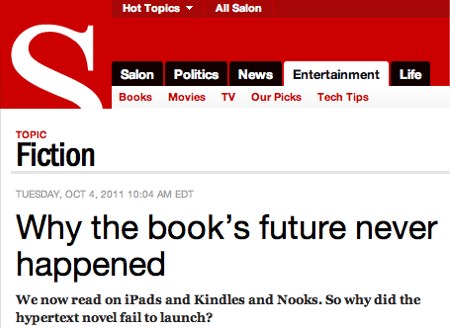Why The Book’s Future Never Happened
Mark Bernstein

Writing in Salon, Paul La Farge argues that the future of the novel lies in hypertext – and that we’ve been doing it all wrong. He thinks that the early hypertext writers (with the exceptions of Shelley Jackson and Geoff Ryman) “just weren’t good enough writers to carry off such a difficult form.”
But I believe that the promise of hypertext fiction is worth pursuing, even now, or maybe especially now. On the one hand, e-books are beginning to offer writers technical possibilities that, being human, we’re going to be unable to resist. On the other, the form fits with life now..... Just as the novel taught us how to be individuals, 300 years ago, by giving us a space in which to be alone, but not too alone — a space in which to be alone with a book — so hypertext fiction may let us try on new, non-linear identities, without dissolving us entirely into the web.
La Farge’s own hypertext is Luminous Airplanes. It begins with a menu – help | about | begin – that recalls the opening of afternoon and its famous question, “Do you want to hear about it?” The response to “help” has a familiar ring:
My god, you think you need help? You’re not the one sitting in his room in New Haven, Connecticut, right now, wondering what the hell happened to your life.
Looks like an interesting, if sparsely-linked, hypertext,
